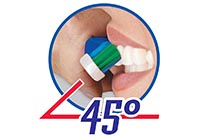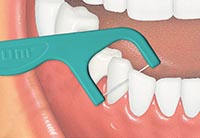Your Periodontic Questions
Click on any of the periodontic questions below.
Q). What is periodontal disease?
Periodontal disease is a bacterial infection of the gums and/or supporting bone of the teeth. The bacteria causing periodontal disease are primarily located within plaque, a colorless film that adheres to the teeth. If plaque is left undisturbed on the tooth the gums may become red and swollen, a periodontal condition known as gingivitis. In some individuals, untreated gingivitis may progress to periodontitis where there is loss of bone supporting the teeth. This may lead to tooth loosening and tooth loss.
Q). Who does periodontal disease affect?
Periodontal disease affects approximately 50% of the North American population. Not all individuals are equally susceptible to periodontal disease. The rate of progression, age of onset and severity of disease may be affected by genetics, smoking, medications as well as systemic risk factors including diabetes and cardiovascular disease.
Q). How do I know if I have periodontal disease?
Periodontal disease is often asymptomatic and may be recognized only by routine examination. It is for this reason that regular dental examinations are important. Symptoms of periodontal disease may include red, swollen gums, bleeding spontaneously or when brushing, loosening of teeth and/or migration of teeth so that gaps between the teeth become larger. Other symptoms may include bad breath, dull aching pain and pus.
Q). How can periodontal disease be prevented?
Periodontal disease may be prevented by good brushing and flossing techniques as well as routine dental examinations to identify early signs of disease.

Brushing
Brushing should be performed 2 times per day. Ideally a soft bristled tooth brush should be used at an angle 45 degrees from the gum in a circular motion. Care should be taken not to "scrub" the gums.

Flossing
Floss should be gently passed between the teeth and curved in a C shape around each tooth as it is brought below the level of the gums. Flossing should be done 2 times per day.
Q). What options do I have to replace a missing tooth?
Removable bridges:
This is the most economic way to replace missing teeth and is often considered when replacement of multiple teeth is needed. It generally has metal clasps that hook around existing teeth to hold the prosthesis firmly in place. It is recommended that the removable bridge is taken out for sleeping.
Fixed bridges:
This type of bridge, which is usually made of porcelain and/or metal is permanently anchored in place by capping the teeth on either side of the missing tooth.
Implants:
Implants offer the advantage of not needing to file down adjacent teeth. A dental implant is an artificial tooth root that is placed within the bone and supports a natural looking tooth.
Q). What are causes of bad breath and how can I treat it?
There are various causes of bad breath including bacterial products on the tongue, certain foods, periodontal disease, skipped meals or hunger, poor oral hygiene and mouth dryness.
Bad breath can be prevented with good oral hygiene including brushing of the tongue, regular dental visits to assess for cavities/gum disease, use of mouth rinses and drinking water frequently. Daily cleaning of removable dentures is also recommended.
Q). What is tooth sensitivity?
Pain to hot or cold foods or to when you breathe in cold air is often due to a loss of gum tissue. Loss of tissue can result from periodontal disease or may be the result of overzealous brushing. When the tooth root becomes exposed, cold/hot temperatures may stimulate nerves within the root and cause sensitivity.
Q). What are Temporomandibular Joint (TMJ) disorders?
TMJ disorders are a group of conditions that cause pain in and around the jaw joint and nearby muscles. Symptoms of TMJ disorders may include:
- pain in the jaw, neck or shoulders
- migraine and/or chronic headache
- jaw muscle stiffness
- limited movement or locking of the jaw
- painful clicking, popping or grating in the jaw joint when opening or closing the mouth
Not all the causes of TMJ disorders are known. Some possible causes include stress and clenching of the face muscles, night grinding, injuries to the jaw area and various forms of arthritis.
Biteplate and nightguards are the most widely used treatments for TMJ disorders. Over-the-counter and prescription medications and gentle jaw stretching and relaxation exercises have also been used in the management of TMJ disorders.
Q). What can I do to treat my dry mouth?
Dry mouth can be a consequence of many prescription medications. It may also be caused by a number of medical conditions including diabetes and Sjögren's syndrome or as a result of generalized dehydration and salivary gland infection. Untreated dry mouth can contribute to cavities, bad breath and discomfort in swallowing, eating or speaking.
Some tips that may be useful in managing the symptoms of dry mouth include:
- Sipping room-temperature water throughout the day and night and carry a water bottle with you at all times.
- Only drink sugarless drinks and avoid carbonated beverages.
- Avoid drinks with caffeine because caffeine can dry out the mouth.
- Chew sugarless gum or suck on sugarless candy to stimulate salivary flow.
- Elect an alcohol-free over-the-counter mouthwash if you are in the habit of using a mouthwash. Read the label and make sure alcohol is not listed as an ingredient.
- Try using a nighttime humidifier to moisten room air.
Q). What are some risk factors for periodontal disease?
SMOKING/TOBACCO USE:
Studies have shown that tobacco use may be one of the most significant risk factors in the development and progression of periodontal disease.
GENETICS:
Research has indicated that some people may be genetically susceptible to gum disease. Despite aggressive oral care habits, these people may be more likely to develop periodontal disease.
STRESS:
Research demonstrates that stress can make it more difficult for the body to fight off infection, including periodontal diseases.
OTHER SYSTEMIC DISEASES:
Other systemic diseases that interfere with the body's inflammatory system may worsen the condition of the gums. These include cardiovascular disease, diabetes, and rheumatoid arthritis.
POOR NUTRITION AND OBESITY:
A diet low in important nutrients can compromise the body's immune system and make it harder for the body to fight off infection. Because periodontal disease begins as an infection, poor nutrition can worsen the condition of your gums. In addition, research has shown that obesity may increase the risk of periodontal disease.
Recent research has shown that genetics may be involved in a person’s risk for gum disease, but there are a variety of other factors that also play a role. The American Academy of Periodontology has an online risk assessment tool that you can use to determine your risk level for gum disease.



